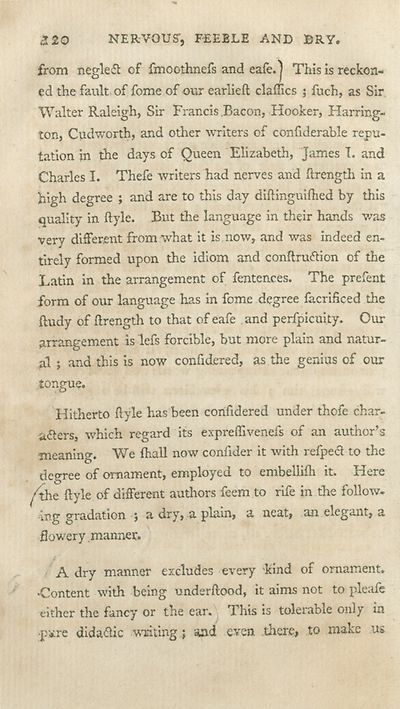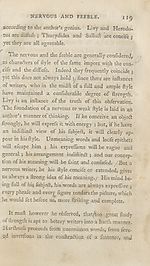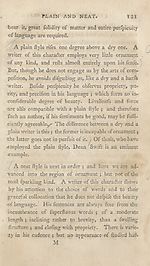Download files
Complete book:
Individual page:
Thumbnail gallery: Grid view | List view

3.20 NERVOUS-, FEEBLE AND DRY.
from negleft of fmoothnefs and cafe.) This is reckon¬
ed the fault of fome of our earlieft clamcs ; fuch, as Sir
Walter Raleigh, Sir Francis .Bacon, Hooker, Harring¬
ton, Cudworth, and other writers of confiderable repu¬
tation in the days of Queen Elizabeth, James I. and
Charles I. Thefe writers had nerves and ftrength in a
high degree ; and are to this day diftinguiflied by this
quality in ftyle. But the language in their hands was
very different from what it is now, and was indeed en¬
tirely formed upon the idiom and conflruftion of the
Latin in the arrangement of fentences. The prefent
form of our language has in fome degree facrificed the
ftudy of ftrength to that of eafe and perfpicuity. Our
arrangement is lefs forcible, but more plain and natur¬
al ; and this is now confidered, as the genius of our
tongue.
Hitherto ftyle has been confidered under thofe char-
a&ers, which regard its expreflivenefs of an author’s
meaning. We ftiall now confider it with refpeft to the
degree of ornament, employed to embellifh it. Here
/foe ftyle of different authors feem to rife in foe follow¬
ing gradation ; a dry, a plain, a neat, an elegant, a
flowery manner.
A dry manner excludes every 'kind of ornament.
•Content with being underftood, it aims not to pleafe
either the fancy or the ear. This is tolerable only in
•pare didattic writing; and even there, to make us
from negleft of fmoothnefs and cafe.) This is reckon¬
ed the fault of fome of our earlieft clamcs ; fuch, as Sir
Walter Raleigh, Sir Francis .Bacon, Hooker, Harring¬
ton, Cudworth, and other writers of confiderable repu¬
tation in the days of Queen Elizabeth, James I. and
Charles I. Thefe writers had nerves and ftrength in a
high degree ; and are to this day diftinguiflied by this
quality in ftyle. But the language in their hands was
very different from what it is now, and was indeed en¬
tirely formed upon the idiom and conflruftion of the
Latin in the arrangement of fentences. The prefent
form of our language has in fome degree facrificed the
ftudy of ftrength to that of eafe and perfpicuity. Our
arrangement is lefs forcible, but more plain and natur¬
al ; and this is now confidered, as the genius of our
tongue.
Hitherto ftyle has been confidered under thofe char-
a&ers, which regard its expreflivenefs of an author’s
meaning. We ftiall now confider it with refpeft to the
degree of ornament, employed to embellifh it. Here
/foe ftyle of different authors feem to rife in foe follow¬
ing gradation ; a dry, a plain, a neat, an elegant, a
flowery manner.
A dry manner excludes every 'kind of ornament.
•Content with being underftood, it aims not to pleafe
either the fancy or the ear. This is tolerable only in
•pare didattic writing; and even there, to make us
Set display mode to:
![]() Universal Viewer |
Universal Viewer | ![]() Mirador |
Large image | Transcription
Mirador |
Large image | Transcription
| Antiquarian books of Scotland > Languages & literature > Abridgement of lectures on rhetoric > (136) |
|---|
| Permanent URL | https://digital.nls.uk/135468086 |
|---|
| Description | Thousands of printed books from the Antiquarian Books of Scotland collection which dates from 1641 to the 1980s. The collection consists of 14,800 books which were published in Scotland or have a Scottish connection, e.g. through the author, printer or owner. Subjects covered include sport, education, diseases, adventure, occupations, Jacobites, politics and religion. Among the 29 languages represented are English, Gaelic, Italian, French, Russian and Swedish. |
|---|

